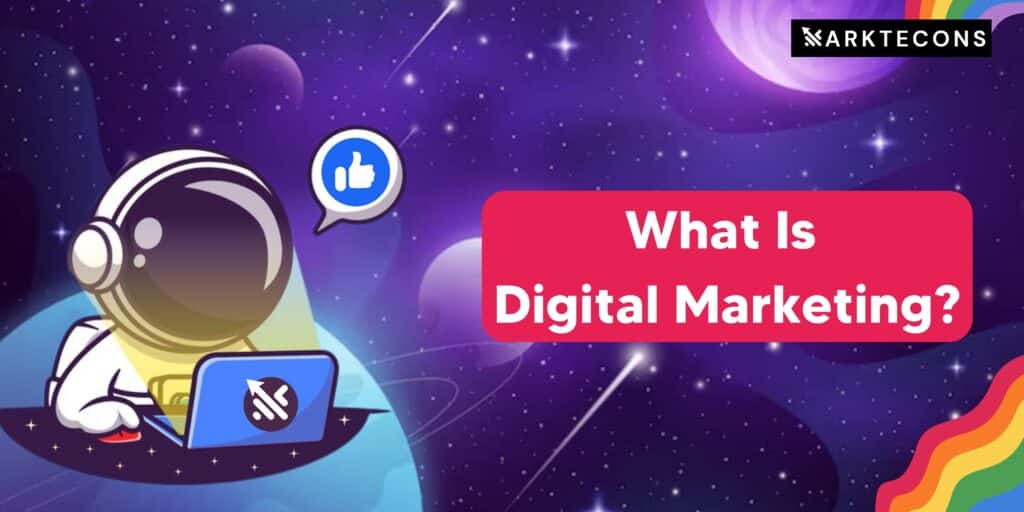What Is Digital Marketing: Beginners Guide|| By Marktecons

In this digital age, where technology and connectivity have become integral parts of our lives, businesses are continually evolving to stay relevant and competitive. Enter digital marketing – a game-changing strategy that helps businesses reach their target audience, boost brand awareness, and drive conversions in the online realm. But what exactly is digital marketing, and what are its key components? Let’s delve into this captivating world and unlock its potential together.
What is Digital Marketing? A Pathway to Online Success
Digital marketing refers to the strategic use of various online channels and techniques to promote products, services, and brands. It involves leveraging digital technologies, such as the internet, search engines, social media platforms, email, and mobile apps, to engage with a target audience and achieve specific marketing goals. The components of digital marketing can be broadly classified into several key areas:
The Power of Search Engine Optimization (SEO)
Search Engine Optimization (SEO) is the process of optimizing a website’s content, structure, and technical elements to improve its visibility and ranking in search engine results pages. By aligning with search engine algorithms, businesses can increase organic traffic, attract qualified leads, and enhance brand credibility. Key SEO techniques include keyword research, on-page optimization, link building, and technical SEO.
Harnessing the Potential of Search Engine Marketing (SEM)
Search Engine Marketing (SEM) involves using paid advertising to increase a website’s visibility on search engine results pages. It includes strategies like Pay-per-Click (PPC) advertising, where businesses bid on keywords to display their ads prominently. SEM allows for precise targeting, measurable results, and quick visibility on search engines, complementing organic SEO efforts.
Captivating Content: The Fuel that Drives Digital Marketing Success
Content Marketing is the practice of creating and sharing valuable, relevant, and engaging content to attract and retain a target audience. It includes various forms such as blog posts, articles, videos, infographics, podcasts, and social media posts. By crafting high-quality content, businesses can establish thought leadership, build trust, and drive customer engagement. Content marketing is closely intertwined with SEO, as optimized content helps improve search engine rankings.
Igniting the Spark: Unleashing the Power of Social Media Marketing
Social Media Marketing (SMM) leverages the popularity and reach of social media platforms to connect with and engage a target audience. It involves creating and sharing content on platforms like Facebook, Instagram, Twitter, LinkedIn, and YouTube to foster brand awareness, drive website traffic, and facilitate customer interaction. Effective SMM strategies encompass content creation, community management, influencer partnerships, and targeted advertising campaigns.
The Role of Email Marketing in Building Customer Relationships
Email Marketing involves sending targeted emails to a database of subscribers to nurture relationships and drive conversions. It includes various types of emails, such as newsletters, promotional offers, event invitations, and customer onboarding sequences. Email marketing allows businesses to personalize messages, deliver targeted content, and automate campaigns, enabling effective communication with prospects and existing customers.
Sealing the Deal: The Role of Conversion Rate Optimization (CRO)
Conversion Rate Optimization (CRO) focuses on maximizing the percentage of website visitors who take desired actions, such as making a purchase, filling out a form, or subscribing to a newsletter. It involves analyzing user behavior, conducting A/B testing, improving website design, and optimizing conversion funnels. By enhancing the user experience and removing barriers to conversion, businesses can increase their overall conversion rates and generate more revenue.
Conclusion:
Digital marketing encompasses a range of components, each playing a crucial role in a comprehensive marketing strategy. From SEO and SEM to content marketing, social media marketing, email marketing, and conversion rate optimization, businesses can leverage these components to achieve online success, drive targeted traffic, engage with their audience, and generate conversions. By understanding and utilizing the power of digital marketing components, businesses can stay ahead in the ever-evolving digital landscape and reach new heights of success.
Subscribe to our newsletter to receive the latest news, tips, and insights on digital marketing and how it can benefit your business.
- +91-9718797494
- MR-1, AltF Noida 142 - 9th Floor, Plot No. 21 & 22, Sector 142, Noida, Uttar Pradesh, 201301
Marktecons – Copyright © 2023

